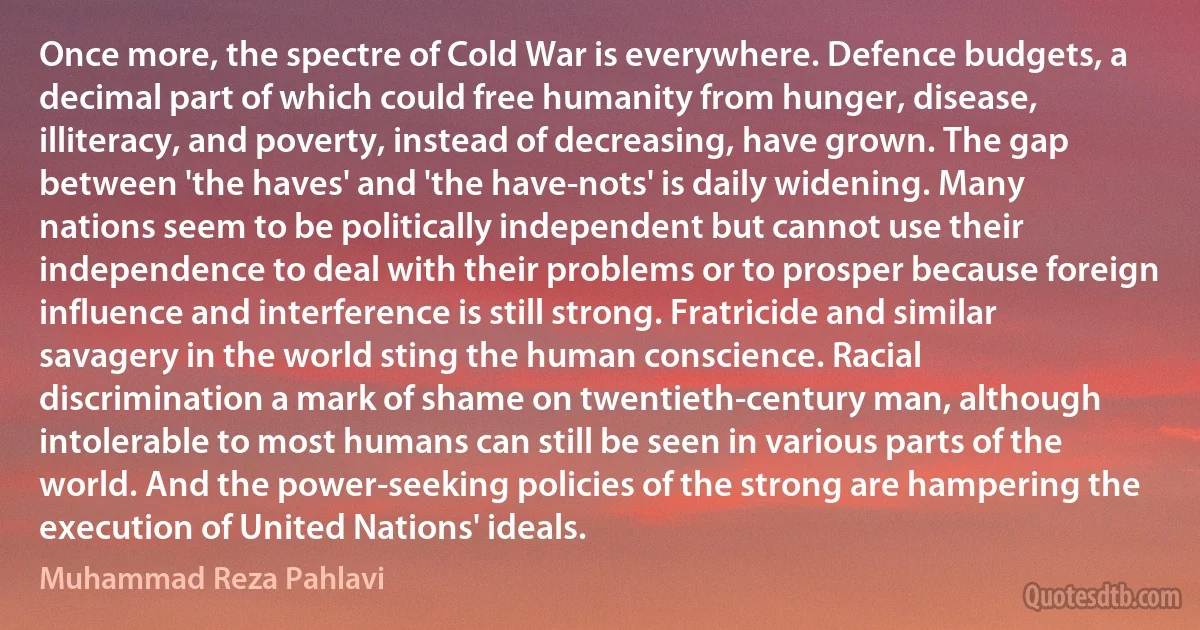
Once more, the spectre of Cold War is everywhere. Defence budgets, a decimal part of which could free humanity from hunger, disease, illiteracy, and poverty, instead of decreasing, have grown. The gap between 'the haves' and 'the have-nots' is daily widening. Many nations seem to be politically independent but cannot use their independence to deal with their problems or to prosper because foreign influence and interference is still strong. Fratricide and similar savagery in the world sting the human conscience. Racial discrimination a mark of shame on twentieth-century man, although intolerable to most humans can still be seen in various parts of the world. And the power-seeking policies of the strong are hampering the execution of United Nations' ideals.
Muhammad Reza PahlaviRelated topics
cold conscience daily deal decimal discrimination disease foreign free human hunger illiteracy interference man mark once poverty racial savagery seen shame sting use war widening world have-nots haves partsRelated quotes
It needs to be acknowledged that the cause of democracy has been served by enlightened thinkers and leaders from various parts of the world, whose efforts resulted in definitive progress of enduring significance. Certain major events such as the Glorious Revolution which led to the presentation of the Bill of Rights of 1868 in Britain, the American War of Independence of 1778 which led to the declaration of Human Rights, and non-violent struggle of India's Independence in 1947, may justifiably perceived as integrated events in world history. Today the democratic State should be seen as having an ideological framework resulting from the contributions of many. Every gain in the cause of democracy benefits all. Equally every injury to this cause affects all.

Shankar Dayal Sharma
Conduct, of course, is possible without science. Humans carried on in their daily affairs long before the first spark of science had been struck. And today there are millions of people living whose actions are not determined by anything we call science. Science, however, could not but gain an increasing influence on human behaviour. To describe this influence roughly and briefly will throw a new light on science. Exaggerating and schematizing the differences, we can say: in the prescientific stage man behaves in a situation as the situation tells him to behave. To primitive man each thing says what it is and what he ought to do with it: a fruit says, "Eat me"; water says, "Drink me"; thunder says, "Fear me," and woman says, "Love me."

Kurt Koffka
June 7, 1776, Richard Henry Lee, on behalf of the Virginia delegation, submitted to the Continental Congress three resolutions, of which the first declared that "these United Colonies are, and of right ought to be, free and independent States, that they are absolved from all allegiance to the British Crown, and that all political connection between them and the State of Great Britain is, and ought to be, totally dissolved. This resolution, which may conveniently be called the Resolution of Independence, was finally voted by the Continental Congress on the 2 of July, 1776. Strictly speaking, this was the official declaration of independence; and if we were a nation of antiquaries we should no doubt find an incongruity in celebrating the anniversary of our independence on the 4 of July.

Carl L. Becker
White blood cells and other cells of ours actively seek out and kill foreign microbes. The specific antibodies that we gradually build up against a particular microbe infecting us make us less likely to get reinfected once we become cured. As we all know from experience, there are some illnesses, such as flu and the common cold, to which our resistance is only temporary; we can eventually contract the illness again. Against other illnesses, though-including measles, mumps, rubella, pertussis, and the now defeated smallpox - our antibodies stimulated by one infection confer lifelong immunity. That's the principle of vaccination: to stimulate our antibody production without our having to go through the actual experience of the disease, by inoculating us with a dead or weakened strain of microbe.

Jared Diamond
Right wrongs no man. If respect is had to majorities, the fact that only one-fifth of the population of the globe is white and the other four-fifths are colored, ought to have some weight and influence in disposing of this and similar questions. It would be a sad reflection upon the laws of nature and upon the idea of justice, to say nothing of a common Creator, if four-fifths of mankind were deprived of the rights of migration to make room for the one-fifth. If the white race may exclude all other races from this continent, it may rightfully do the same in respect to all other lands, islands, capes and continents, and thus have all the world to itself, and thus what would seem to belong to the whole would become the property of only a part. So much for what is right, now let us see what is wise.

Frederick Douglass
